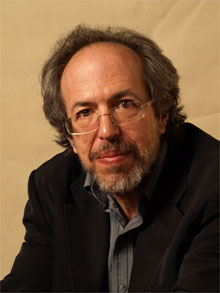
Smolin
Lee Smolin (6 June 1955 - ) is a leading figure in the field of loop quantum gravity, one of the two main approaches to the unification of quantum theory and gravity (the other being superstring theory, which also unifies the standard model of particle physics with gravity). He and Carlo Rovelli were the first to find a class of exact solutions to the Wheeler-DeWitt equation, and to define area and volume quantum operators with purely discrete spectra. This approach has a natural interpretation in terms of spin networks and spin foams, as invented by Penrose among others. According to Smolin, it principal virtues are the thoroughgoing rejection of a fixed background spacetime, in contrast to superstring theory, and implements many of Leibniz’s and Mach's philosophical arguments in favour of relationalism. Smolin was also greatly influenced by Julian Barbour's construction of genuinely Machian theories of gravity.
Smolin has made a number of cosmological proposals. In 1992 and in his later book The Life of the Cosmos (1997), he proposed a mechanism whereby stellar collapse, leading to the formation of a black hole, may also result in a new universe whose fundamental physical constants differ from those in our universe. Those universes the constants of which lead to the production of large numbers of black holes will then dominate in the total population of universes. Since such universes are also those in which stars are produced in large numbers, they are universes conducive to the formation of heavy elements and therefore to the existence of life. The appearance of fine-tuning is thus explained without appeal to an anthropic principle or to selection effects. The idea draws on the notion of a ‘fitness landscape’ in evolutionary biology, and led to a similar terminology, a ‘landscape of parameters’ in correspondence to a population of universes or multiverse. The terminology ‘string-theory landscape’, where the parameter space labels different compactifications (and hence vacuua) in string theory, derives from this. In his The Trouble With Physics (2006), Smolin went on to make a number of criticisms of string-theory, not only in its dependence on the 'correct' compactification but in connection with broader methodological, sociological and insitutional concerns.
More recently, Smolin has shown that a theory similar to quantum mechanics can be derived from the assumption that the probabilities for events of a given qualitative nature are proportional to the total number of events of that kind that have so far occurred – wherever they are in the universe. The theory is thus radically non-local, but illustrates the notion of ‘law without law’, first proposed by John Archibald Wheeler, according to which laws themselves evolve in the universe. In his most recent book Time Reborn he argues that the idea of evolving law is in conflict with the usual 4-dimensional perspective of relativistic spacetime and with it the ‘geometrization’ of time.
Smolin was born in New York City and educated at Hampshire College. He received his PhD from Harvard University in 1979. He has held positions at Syracuse, Pennsylvania State, and Yale Universities, and was a founding member of the Perimeter Institute of Theoretical Physics in Waterloo, Canada.
Links
Multimedia
RSA: 21st Century Enlightement. Lee Smolin, Time Reborn >
Talk of the Nation: Lee Smolin and Brian Greene on string theory >
Edge: The Third Culture. Susskind vs Smolin: the Anthropic Principle >
